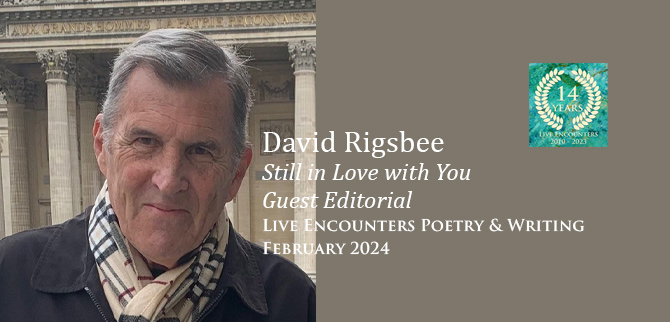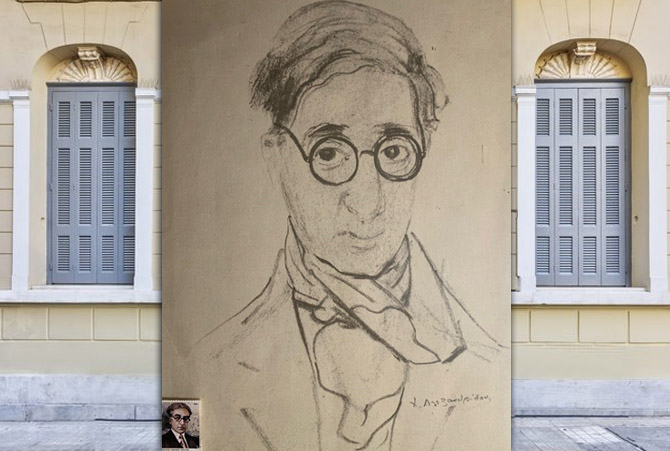
Live Encounters Poetry & Writing February 2024.
Still in Love with You, Guest Editorial by David Rigsbee.

Ionian
Of course, I want my mind to expand, just as the rest of me would like to. But instead, so often it shrinks to a point here and one there, each one just slightly out of focus. If I think of love as a subject, my shrunken mind feels like a man walking among ducks: they are with me (or I with them), and yet they avoid me as I approach. Nevertheless, I like their company, and if some waddle away, as eventually they all will, that’s okay. It’s after all the subjects of love poems to love well what we’re going to lose, guaranteed. I’m charmed by their presence, but I sense somehow that it’s the images that are my takeaway. Inwardly I thank them: thank you images, for taking me out of myself and involving me with the world of feelings. Otherwise, what? It’s a cold day today. August and the memory of it are at the apogee. The wind moves among the winter trees, and yesterday the Hudson overflowed in the park, leaving picnic tables and benches submerged, where last summer children and their parents picked over their fêtes champêtres. Time is not our friend, and yet, I also feel gratitude towards it. It’s left me my library of images. My mentor Brodsky, himself Hermetic enough to imagine flying for real, argued that, as Auden said, time worships language and forgives us if we live by it, because we live by it. John said that in the beginning was the word. Mallarmé completed that assertion by adding that everything exists to wind up in a book. Thus did the gods themselves survive the centuries of vilification from alien pulpits and chilly altars, to say nothing of religious wars and crusades.
Years ago some poet in Rome whose name I don’t remember, told me that the name “capitol,” as in the Capitoline Hill, the largest of the seven hills of Rome, derives from the spot where one “Olus,” whom he identified as an obscure Etruscan warrior, possibly a king, lost his head, his “caput.” Wikipedia informs me that others have argued the name to be Tolus. It doesn’t matter. Brodsky wrote an essay on the Campidoglio, but I haven’t read it, as I sensed that his real love wasn’t Rome, not even Florence, Dante’s home, but Venice, where he is buried on an island in the same cemetery as Ezra Pound and Olga Rudge, with the remains of Stravinsky and Diaghilev secured nearby. On Brodsky’s tomb is inscribed, “Letum non Omnia Finit—”Not everything ends in death.” I’d like to believe that, but we can’t know, can we? I prefer to think we write poems to hedge our bets.
Carolyn Kizer’s last published poem ends, “Let me enter my chamber/ and sing my songs of love.” Here, she’s quoting St. Augustine (Confessions, Book VII), whose own connection with love was problematic. We would expect no less from a Church Father. Did he not plead with the Almighty to give him just a few more days of carnal desire before assenting to become a taxpayer in the City of God, knowing in his heart that he (also) wished otherwise? At the very least, he was reluctant to embrace the ambivalence of his heart. But Kizer, who was not above skewering both Augustine and Kierkegaard for their emotional timidity, humbly admits that she would prefer to move inward near the end, to celebrate the images that animated her time on earth.
These poets are also images to me. They and others about whom I have written form the caryatids of a pantheon. As Milosz remarked, “language has its own greatness and selects its own people to serve it.” Dante, whom I recently translated, called up the muse figure Beatrice, whom he scarcely knew, and Virgil, whom he didn’t know at all, except in his imagination. The first appealed to his virility, even as she grew into a spirit beyond his reach, and the latter as the measure of his ambition, of his (Miltonian, if you will) wish to justify the contrary aims of life and afterlife. Jesus himself is said to have had a beloved figure, but we don’t know with certainty who that was. Many religious head-scratchers think it was either John or Lazarus, possibly Judas. John adds, “These things are written that you may believe!” That’s what poems are. All poems are elegies in the sense that they come out of the past to encounter our feeling minds. Their very presence points to the absence that is their source and that they represent. In that our poems resemble us. They stand in the place of us. Do they also point to the future? Of course. Of temporal categories, past, present, and future together equal as much about eternity as we are able to imagine. There has been a lot of talk in poetry circles recently about the disappointments that attend our experience in reading poems on the grounds that poems don’t deliver what they promise. And why is that? Because the eternal exceeds their reach. They’re snared and hobbled by history, canceling any promise.
That’s not exactly how I see it. Poetry already rewrites time, just as music does. In fact, you might argue that rewriting time more to our liking is what defines music. It’s what the poet’s pen and the conductor’s wand have in common. The late Allen Grossman, whose deep dives into the sources of poetry schooled many poets of my generation, in spite of a prose that often banished clarity to the shadows, wrote, “Insofar as love wills the existence of what it loves, the principle of poetry is a collective and perpetually renewed act of love that brings the world to mind, and mind to mind, as the speech of a person – at the moment of the vanishing of world and persons, which is every moment of conscious life.” The point is not to get in touch with the eternal, but to create images that signify its possibility. Cavafy’s poem goes directly to that point.
Where am I going with this, you may wonder. Am I merely talking about intimation, after all? D. H. Lawrence, who suffused his poems with the same Mediterranean light as Cavafy, also has a poem about Hermes called “Maximus” but instead of an “ethereal” youth the speaker takes in a cloaked stranger who, when asked his name, is at first silent. Yet his presence inspires “such a loveliness” that the speaker intuits him as a god, even God, but the stranger replies, “Hermes!” Placed beside the god of the Bible, Hermes is the more relatable figure, and the speaker finds him in the warmth of his home. He is, in other words, the very God, and if we are to believe Linda Gregg’s lovely line, He “thinks about poetry all the time.”
God is older than the sun and moon
and the eye cannot behold him
nor the voice describe him
and still, this is the God Hermes, sitting by my hearth.
Hermes was sometimes confused with the god Pan, but the consensus holds that in the ancient genealogies of divinity Pan was the son of Hermes. In either case, we are right to understand the connection between the two. Pan is universal. In Milton’s Nativity Ode, “mighty Pan” prefigures Christ. Hermes likewise is everywhere, including moving into the vivid domestic space described by Lawrence and topping hills of Ionia for Cavafy, “indistinct” and “in rapid flight.” Not only is he everywhere, he is temporally unbound: the beautiful young man and the aged, unanticipated guest of the poet. Images are like that: paradoxical. You are unlikely to be interested in poetry if you are not at home with paradox. Not only at home, but ready to will paradox into being on your own.
In Cavafy’s poem, the gods we thought to have driven out “are still in love with you/ Their souls still keep your memory.” Dante greeted Virgil as “master of the memory of earth.” Not the least of these was the image of smoke rising from Dido’s pyre, as the Virgil’s hero Aeneas set sail to embark on his brutal destiny but unaware of its personal price until he meets his lover in the underworld where she turns away wordlessly and fades into the ghostly arms of her first husband. Aeneas wills his way toward Italy. He also wills his way toward sustainable abstractions: duty and honor, etc., among them. But the memory of smoke and the violence that accompanies him voids his lingering tenderness. His father, whose ghost he dared to seek among the shades, enumerates a colossal future for his son, but his lover’s silence is mockery outright. Cavafy raises the issue of powers only half seen, only intimated in the sheerness of a moment, but signifying a reality for all time, which is paradoxically a defeat of time, where we live out our lives. Grossman sees this as an investment of love, of the belief that our images are worth preserving and that they, in turn, preserve us. Proust, who knew as much about memory as anyone who ever lived, taught us that something remembered is infinite, because it is a passport to all that happened before and all that happens after. Meanwhile, only the person who has the memory can say how deep into the past or the future it reaches.
I don’t know where the ducks are going, but I know they live by the marshes on the side of the river. The water has now receded. Train tracks parallel to the river carry commuters down to the city. During the pandemic, the vast parking lot was largely empty, but now it is full. You can still see ponds of rainwater on the asphalt. At night, they ice over, as does the riverbank. Some years ago I wrote a poem called “Empire Service.” In it, I tried to hint, as Hart Crane did, of the massive machinery of which we are a part, with a nod to Dante who ends his Commedia with his absorption into the machinery of Heaven. Here is the ending:
At Croton, a wedge of ducks
makes way across the still inlet.
Farther out, swans. Two of them.
Just for a second do they register.
Weeds are everywhere out there.
And yet it’s winter and they’re dead too,
though still standing at attention,
still presenting themselves somehow
to the vines, the trunks, the sky.
Then off in the distance I hear the horns
warning of the train, and I’m on it.
© David Rigsbee
David Rigsbee is an American poet, critic and translator who has an immense body of published work behind him. Salmon Poetry has just published his translation of Dante’s Paradiso, and Black Lawrence Press will bring out his Watchman in the Knife Factory: New and Selected Poems in June, 2024.


What a totally absorbing piece, thank you David. I’ll keep going back to it. Cavafy’s Young ethereal figure and Hermes, enriching that poets’ place between past and future .
David
Thank you for your remarkable prose which I see engages one as wholly as poetry. I appreciate your imagery of the Hudson and the eternal train as I have cherished being transported from the City to Hamilton where Literature greeted me in 1971. I must read more again to continue my ride, peering through the memories I’ve been gifted.